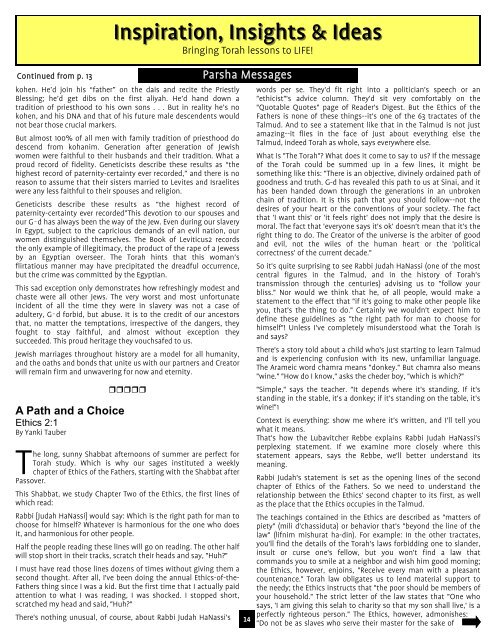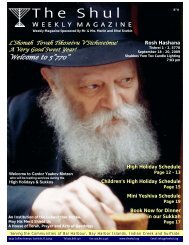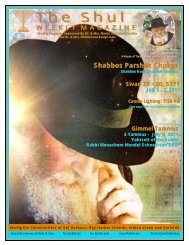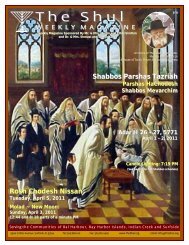Create successful ePaper yourself
Turn your PDF publications into a flip-book with our unique Google optimized e-Paper software.
Inspiration, Insights & Ideas<br />
Bringing Torah lessons to LIFE!<br />
Continued from p. 13 Parsha Messages<br />
kohen. He’d join his “father” on the dais and recite the Priestly<br />
Blessing; he’d get dibs on the first aliyah. He’d hand down a<br />
tradition of priesthood to his own sons . . . But in reality he’s no<br />
kohen, and his DNA and that of his future male descendents would<br />
not bear those crucial markers.<br />
But almost 100% of all men with family tradition of priesthood do<br />
descend from kohanim. Generation after generation of Jewish<br />
women were faithful to their husbands and their tradition. What a<br />
proud record of fidelity. Geneticists describe these results as “the<br />
highest record of paternity-certainty ever recorded,” and there is no<br />
reason to assume that their sisters married to Levites and Israelites<br />
were any less faithful to their spouses and religion.<br />
Geneticists describe these results as “the highest record of<br />
paternity-certainty ever recorded”This devotion to our spouses and<br />
our G‑d has always been the way of the Jew. Even during our slavery<br />
in Egypt, subject to the capricious demands of an evil nation, our<br />
women distinguished themselves. The Book of Leviticus2 records<br />
the only example of illegitimacy, the product of the rape of a Jewess<br />
by an Egyptian overseer. The Torah hints that this woman’s<br />
flirtatious manner may have precipitated the dreadful occurrence,<br />
but the crime was committed by the Egyptian.<br />
This sad exception only demonstrates how refreshingly modest and<br />
chaste were all other Jews. The very worst and most unfortunate<br />
incident of all the time they were in slavery was not a case of<br />
adultery, G‑d forbid, but abuse. It is to the credit of our ancestors<br />
that, no matter the temptations, irrespective of the dangers, they<br />
fought to stay faithful, and almost without exception they<br />
succeeded. This proud heritage they vouchsafed to us.<br />
Jewish marriages throughout history are a model for all humanity,<br />
and the oaths and bonds that unite us with our partners and Creator<br />
will remain firm and unwavering for now and eternity.<br />
<br />
A Path and a Choice<br />
Ethics 2:1<br />
By Yanki Tauber<br />
T<br />
he long, sunny Shabbat afternoons of summer are perfect for<br />
Torah study. Which is why our sages instituted a weekly<br />
chapter of Ethics of the Fathers, starting with the Shabbat after<br />
Passover.<br />
This Shabbat, we study Chapter Two of the Ethics, the first lines of<br />
which read:<br />
Rabbi [Judah HaNassi] would say: Which is the right path for man to<br />
choose for himself? Whatever is harmonious for the one who does<br />
it, and harmonious for other people.<br />
Half the people reading these lines will go on reading. The other half<br />
will stop short in their tracks, scratch their heads and say, "Huh?"<br />
I must have read those lines dozens of times without giving them a<br />
second thought. After all, I've been doing the annual Ethics-of-the-<br />
Fathers thing since I was a kid. But the first time that I actually paid<br />
attention to what I was reading, I was shocked. I stopped short,<br />
scratched my head and said, "Huh?"<br />
There's nothing unusual, of course, about Rabbi Judah HaNassi's<br />
14<br />
words per se. They'd fit right into a politician's speech or an<br />
"ethicist"'s advice column. They'd sit very comfortably on the<br />
"Quotable Quotes" page of Reader's Digest. But the Ethics of the<br />
Fathers is none of these things--it's one of the 63 tractates of the<br />
Talmud. And to see a statement like that in the Talmud is not just<br />
amazing--it flies in the face of just about everything else the<br />
Talmud, indeed Torah as whole, says everywhere else.<br />
What is "The Torah"? What does it come to say to us? If the message<br />
of the Torah could be summed up in a few lines, it might be<br />
something like this: "There is an objective, divinely ordained path of<br />
goodness and truth. G-d has revealed this path to us at Sinai, and it<br />
has been handed down through the generations in an unbroken<br />
chain of tradition. It is this path that you should follow--not the<br />
desires of your heart or the conventions of your society. The fact<br />
that 'I want this' or 'it feels right' does not imply that the desire is<br />
moral. The fact that 'everyone says it's ok' doesn't mean that it's the<br />
right thing to do. The Creator of the universe is the arbiter of good<br />
and evil, not the wiles of the human heart or the 'political<br />
correctness' of the current decade."<br />
So it's quite surprising to see Rabbi Judah HaNassi (one of the most<br />
central figures in the Talmud, and in the history of Torah's<br />
transmission through the centuries) advising us to "follow your<br />
bliss." Nor would we think that he, of all people, would make a<br />
statement to the effect that "if it's going to make other people like<br />
you, that's the thing to do." Certainly we wouldn't expect him to<br />
define these guidelines as "the right path for man to choose for<br />
himself"! Unless I've completely misunderstood what the Torah is<br />
and says?<br />
There's a story told about a child who's just starting to learn Talmud<br />
and is experiencing confusion with its new, unfamiliar language.<br />
The Arameic word chamra means "donkey." But chamra also means<br />
"wine." "How do I know," asks the cheder boy, "which is which?"<br />
"Simple," says the teacher. "It depends where it's standing. If it's<br />
standing in the stable, it's a donkey; if it's standing on the table, it's<br />
wine!"1<br />
Context is everything: show me where it's written, and I'll tell you<br />
what it means.<br />
That's how the Lubavitcher Rebbe explains Rabbi Judah HaNassi's<br />
perplexing statement. If we examine more closely where this<br />
statement appears, says the Rebbe, we'll better understand its<br />
meaning.<br />
Rabbi Judah's statement is set as the opening lines of the second<br />
chapter of Ethics of the Fathers. So we need to understand the<br />
relationship between the Ethics' second chapter to its first, as well<br />
as the place that the Ethics occupies in the Talmud.<br />
The teachings contained in the Ethics are described as "matters of<br />
piety" (mili d'chassiduta) or behavior that's "beyond the line of the<br />
law" (lifnim mishurat ha-din). For example: In the other tractates,<br />
you'll find the details of the Torah's laws forbidding one to slander,<br />
insult or curse one's fellow, but you won't find a law that<br />
commands you to smile at a neighbor and wish him good morning;<br />
the Ethics, however, enjoins, "Receive every man with a pleasant<br />
countenance." Torah law obligates us to lend material support to<br />
the needy; the Ethics instructs that "the poor should be members of<br />
your household." The strict letter of the law states that "One who<br />
says, 'I am giving this selah to charity so that my son shall live,' is a<br />
perfectly righteous person." The Ethics, however, admonishes:<br />
"Do not be as slaves who serve their master for the sake of














